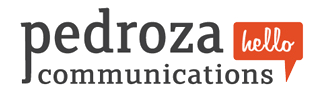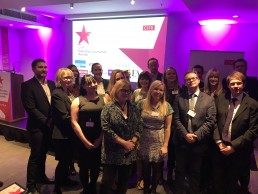We’ve Partnered With The Education Media Centre
Would you like to help a small charity to champion the cause of evidence-based education and raise the profile of your own work at the same time? Now you can!
We’re delighted to announce that Pedroza Communications has formed a partnership with The Education Media Centre to help organisations get noticed in the schools sector.
The EMC is the UK`s only independent charity dedicated to raising public and media awareness of research and evidence behind the education stories in the news. The EMC exists to provide journalists with briefings on new research and help education institutions to communicate research more clearly.
Under this new arrangement, the EMC will introduce us to their supporters and in return, we will give the charity 10 per cent of everything their supporters spend on our services. This in turn will help the charity step up its work with the news media, ensuring that the best evidence about what works in education gets to those who can use it.
Everyone who works with us in this way through the EMC will be acknowledged on their website as an EMC supporter, have a link to your website on theirs, and you'll be able to mention you are an EMC supporter on publicity materials.
Fran Abrams, CEO, Education Media Centre says:
“I’m delighted that EMC is forging this new relationship with Pedroza Communications. Our mission as a charity is to try to get the best evidence about education to those who can use it, and we hope this arrangement will enable us to do more to further that aim.”
We’re looking forward to working more closely with the EMC, supporting the charity, and having the chance to work with an even wider range of organisations and businesses involved in education.
How you can use new research to generate PR
If you look through any newspaper or browse any education news platform, you’re likely to see stories linked to new research. In this article we look at how you can use research to secure valuable coverage.
Why research is important for PR
New findings from research can be a great way to create a news story that will attract media coverage. In the education sector, that could be brand new information that typically examines an education issue or concern- anything from the off-rolling of students, to the use of learning platforms in secondary schools, to the ways in which schools are using lunchtime supervisors, can warrant research. Types of research can include:
- Large scale, long-term research studies
- Small research studies
- Individual surveys
- Annual ‘state of the nation’ reports that compare year-on-year findings
How can you conduct useful research that doesn’t cost the earth?
Unless you’re a university or you have access to a large in-house research team, it is likely you will need to commission an organisation to undertake the research. This could be a university department, a market research company, a polling company, a think tank, or simply a freelance researcher.
If you’re a membership body, or you represent a particular audience, you may well be able to research your members and gather useful insight. Members can provide valuable information but be aware that journalists may be more sceptical about the findings if they feel they are self serving.
Another option is to mine the data that your organisation collects and look for findings which have wider implications. For instance, The Key publishes a useful annual report about the schools sector which is based on their own data.
A quick word on opinion polls
Opinion polls are a useful and cost effective way to gather information from a particular group of individuals, such as teachers. They can help to inform more detailed research but they are also used in PR as stand alone research. This is OK, but ensure you work with a Market Research Society accredited polling company and that the sample size is large enough to be able to extract useful information. A minimum sample should be 1001 respondents, but if you plan to cut the data at a regional level, the sample needs to be larger so that the data is still robust. More information about polling can be found here.
Creating a research-led story
Although there may be many findings that are interesting, it’s essential that you think about what is actually newsworthy. What is going to appeal to the journalists you plan to target? Is there more than one angle?
Draft the release and ensure you explain the research methodology, who undertook it and when it was undertaken. Be prepared to share the full report and possibly the underlying data that has informed the research.
As well as the right news line, make sure you can offer a range of spokespeople and case studies. These can include:
- A representative of your organisation who can discuss the research findings and their implications
- An external expert who can provide comment on the wider picture (sometimes one of the contributors to the research)
- Individual ‘case studies’ who can talk about their own experience, for example if research was about workload in early career teachers, then a teacher who has been in the profession for a couple of years would be ideal.
Pitching your research story – what NOT to do
Ed Dorrell, Head of Content at Tes has some useful pointers for education PRs pitching research stories:
- Avoid overblown claims about the implications of research such as "a revolution in teaching methods”. Instead, let the research speak for itself
- Avoid confusing correlation with causation – a common mistake. A correlation alone does not imply causation
- Don’t ‘dress up’ small research studies to appear something more than they are. Be honest about the scope of your research
- Don’t claim conclusions which seem too good to be true. Most journalists can smell an exaggeration a mile away!
Don’t let the tail wag the dog
Research should never be commissioned simply to generate headlines, that may be a consideration, but the value of research is much more than just coverage. It can help to push forward a debate, influence thinking and help an organisation to hold a more authoritative position. It also provides valuable material for talks, sales information, newsletters, social media and online.
What’s important is that you don’t miss opportunities for media coverage. Make sure you plan early on and ensure your research asks the right questions to provide useful insight and some valuable news angles.
So there you have it. Good luck pitching your education research. As usual, if you have any questions about how to use research in PR then do get in touch. We’d love to hear your ideas and discuss any ways that we could help.
Education PR: What Journalists really want to know
The key to a great press campaign lies in knowing what journalists are really looking for in a news story. So before you start pitching your next campaign, take a few minutes to discover what journalists really want to hear.
Research & relevance
If you really want to understand what will interest the journalist and their readers, invest some time in looking at their output. Which issues do they seem most concerned about? It can be tempting to pitch every story to as many journalists as possible, but this is rarely a good idea. Sending irrelevant press releases to a journalist is more likely to damage your relationship with them than to help you build a strong connection. So, pitch to the journalists who you think are most likely to find your story relevant to their audience.
News hooks
A news hook is what makes your story relevant and is why a journalist may want to cover it. Start by asking yourself the question, 'so what?’ and focus on why your story is important today. For example, what will happen if everyone ignores your latest research? What impact will this have? When you pitch make sure your hook is summarised in the subject line of an email and reiterated in the first line of the email. Click here for more tips on how to create a good news story.
Good timing
It’s not a secret that journalists are busy people. To maximise your chances of reaching them on the phone, avoid calling radio or TV journalists when their show is on air, and don’t call weekly on monthly publications on their press day (that’s the day they put the publication to bed).
Facts and evidence
‘Fake news’ is a real concern amongst journalists and readers these days and for good reason. The increased awareness makes people more sceptical about the news that they consume and for this reason, journalists will want to know that the information you’re providing is accurate. Double-check any facts and figures that you’re sharing and make sure you can defend every point in your press release.
A press release
According to Cision’s 2018 ‘Global State of the Media’ study, when it comes to valuable content, reporters and editors still trust a press release most. 63% of those involved in the study said that news and announcements are the two key things that they want from their PR contacts. Click here for more advice on how to pitch your story.
Data and expert sources
Try to be as helpful as you can by providing additional information relating to your story. If you can help a journalist with researching their stories, they are more likely to see you as an asset and may even start to reach out to you for support or comment in the future.
Video and audio
Including audio and video in your pitch can increase the likelihood of your story being published. Stories with additional multimedia assets are often more popular amongst readers and these assets also save the journalist from having to source additional content.
Links to awareness days
Pitching your story on the relevant awareness day is a great idea but you need to have a good story. Make sure that the awareness day is relevant to the journalist’s audience and ensure that you have something good to hook to the day. If you’re looking for a list of education-specific awareness days, our up-to-date calendar is a good place to start.
Finally, the best way to pitch your story is to put yourself in the shoes of the journalist. What would you do if you were writing a news story based on some new research, working on a package for a TV news piece or developing ideas for a feature in a monthly magazine? What would interest others? Thinking like a journalist is the best way to put together a pitch that will succeed in getting attention.
TDT analysis shows CPD spend has fallen by £23.2 million
I’m very proud to be a Trustee of the Teacher Development Trust (TDT). Earlier this month the Trust released the results of new analysis they conducted into schools’ Continued Professional Development (CPD) budgets. The analysis was undertaken by school data specialists School Dash.
The report, which includes schools across the UK, shows that spending on CPD has fallen by £23.2 million in 12 months, with spending falling by 12% in secondary schools and 7% for primary schools.
These results come after the National Foundation for Educational Research voiced concerns about the value of CPD, especially for newly trained teachers starting in the classroom.
TDT’s Chief Executive, David Weston, has warned that funding constraints are to blame for the huge drop in spending on CPD, although it has also been suggested that more schools and trusts are choosing to train staff in-house as a most cost-effective alternative.
You can read the full report here and it’s also been reported in Schools Week and The Independent.
How to secure PR during Bett 2019: our tips
Bett starts tomorrow and if you’re exhibiting at the event, we hope you’re feeling prepared and ready to make the most of your presence. Generating PR during the event is a great way to promote your presence and ensure your potential customers know about you. Read on for our top tips for creating a PR buzz during Bett 2019.
Make contact with journalists
Keep tabs on the journalists that are attending and formulate a plan to engage with them. One way is to keep an eye on their Twitter streams. They may well Tweet when they are at Bett, giving you an opportunity to reach out to them.
Connect with the event organisers
Brief the show organisers about what you are doing that’s newsworthy each day. WithPR is the PR agency handling all media at BETT, so get in touch and ask them which journalists they are expecting to attend and on which day.
TV opportunities
Wednesday is generally the day when broadcast media attend Bett. TV needs to have something interesting to film. If you're showcasing something eye-catching, a well-known expert is attending your stand, or there are some school children trying out your tech, this could appeal to TV journalists. Get in touch with the press office and find out when they expect any TV crews and what you can offer.
Consider ways to attract attention
Prepare a few things that will draw attention to your stand and provide film or photo opportunities. These could include hands-on demos, audience participation, eye-catching guest visitors or VIPs.
Be opportunistic!
Don’t be shy! If you spot a journalist or blogger, say hello! Badges will usually make it clear if someone is a journalist. Ask them who they report for and what they’re interested in, then think about whether you can help them. If not, you could try and suggest a fellow exhibitor.
Review the speaker schedule
Journalists are often co-opted to chair panels. Check the speaker line up to see if anyone is listed. If a journalist is chairing the session, ask a question, and sit right at the front so you can have a quick chat with them at the end of the session.
Prepare some print materials
Don’t underestimate the value of flyers and business cards. They can be a great way to remind a journalist of your product or initiative after the event, so don’t be afraid to hand them out.
Finally, good luck with Bett 2019! We look forward to seeing you there. If you’d like to meet up, please give me a call on +44 (0)7813 938 020 or you can email me.
Dates for your diary: 2019 Awareness Days for Education Specialists
Awareness days can be a great way to connect with people with similar interests and reach out to a relevant audience. We’ve compiled an always up-to-date calendar of some of the most relevant awareness days for those involved in teaching and education. These are key days that those in education are likely to engage and are a good way to reach and engage your target audience.
We’ll keep this calendar updated throughout the year. Simply save this link to your bookmarks and you can take a look at it whenever you like. Click here to view it. Please let us know if you’d like to suggest an event for inclusion.
How to make the most of awareness days: Our top tips on how to join or start a conversation.
Focus on the awareness days that link best with what you do
Pick a few awareness days that link best with what you do and think carefully about how you are going to start or join the online conversation on that day. Make sure that there’s a clear link between what you do and the particular awareness day.
Don’t just try to sell your product or service. Think about how you can join the conversation and what you can add to it.
Avoid direct selling instead think about how you can add to the debate and, through this, promote your brand. Some ideas are:
- Create a piece of useful content, such as a guide or article, that helps people to understand the importance of the awareness day
- Offer your solution to an issue that the awareness day promotes and ask for people’s opinions
- Share case studies that are relevant to the awareness day it’s fine for these to talk about your product or service, as long as they add to the conversation
- Ask people to share their recommendations. For example on World Book Day, you could encourage your followers to share a photo of their favourite book
Whatever your link, make sure that you are inspiring people to respond and engage with you.
Plan ahead
Making the most of an awareness day needs planning. Think about the marketing materials you’ll need, so you don’t miss out. Plan how you will use all your channels in the run-up to the day and during the day. You can schedule tweets, Facebook posts and emails in advance to give more time on the day to encouraging engagement and responding to comments.
Use them to secure media coverage
Awareness days can provide a great hook for a news story. They help to answer a journalist’s common question; ‘why is this relevant now?’. An awareness day also connects your news to a larger national dialogue. Many journalists will be looking for stories on these topics to coincide with the day, but make sure you speak to them ahead of the day to have the best chance of securing coverage
Use hashtags
Make a note of the hashtags for each awareness day and include them on any social media posts. This means that you’ll appear in the feed of anyone who is following that hashtag
Be present, be reactive
Once you’ve sparked a conversation, the key is to keep it going. Try to set aside time throughout the day to respond to or share any comments.
Exhibiting at Bett 2019? Download our practical guide to securing PR
Bett 2019 is just around the corner and if you’re exhibiting at the show, you’ve already made a major investment. So how do you ensure it delivers everything you hope? With more than 40,000 people visiting the show you need a plan if you’re to maximise your investment and reach the right people who will be interested in what you have to offer. The good news is that there's still time to generate some brilliant PR before, during and after the event.
You can start by downloading our popular Bett 2019 Guide which is packed full of practical advice and tips.
If you'd like more support, then get in touch with the experts and let us help you plan and deliver a campaign that will get your voice heard.
Call us on 07813 938020 or email anna@pedrozacommunications.co.uk
The Bett Show: 5 ways to secure brilliant PR
The Bett Show is the biggest education technology show in the world. More than 40,000 people visit the show and hundreds of companies, organisations and governments exhibit each year. Whether your priority is generating new leads, closing sales, or building new partnerships, check out our top tips for getting the right people to visit your stand.
For a more detailed guide to securing brilliant PR before, during and after the Bett Show, click here to view and download our Bett 2019 Guide.
Plan ahead
Get your Bett marketing plan in place well in advance of the event. In the run-up to Bett, many education publications produce previews featuring highlights of what’s happening at the event. There’s only a little while left and competition to be featured is fierce, so this a priority and you won’t regret it!
Identify your target audience
To get the right people talking about you, it’s essential to identify who you want to reach and what you want to tell them. Are they secondary teachers, primary head teachers, or ICT coordinators? Be clear whom you want to target.
Research your media list
There are thousands of media outlets, so do your research to understand your target audience. Talk to your existing customers and find out what they read, watch, and engage with when they are in ‘work mode’. You can check out some of our favourite Primary Education Publications for inspiration.
Create a newsworthy story
Journalists and bloggers need to have something that’s new, timely and relevant to write about. How can you create something that will grab their attention? Think about what is most newsworthy, what will appeal to the audience, and help to set you apart.
Pitch your story
It is worthwhile preparing a press release about your news, but pitching a story to a journalist is much more than simply emailing them your press release. Our Bett 2019 Guide is packed with practical tips on how to structure and send your press release.
There are plenty more ways that we can help you to make the most of Bett 2019. For more detailed information and tips, download our full Bett 2019 Guide. You can also get in touch and let us help you plan and deliver a campaign that will get your voice heard. Good luck with Bett 2019!
Tips to help you network more effectively
We advise a lot of our clients on how to raise their profile by attending events. As a result of this, one topic that I am often asked about is networking. In fact, the funny thing is that so many clients ask me how they can improve their networking skills, yet each one feels that they’re completely alone in their struggle. This couldn’t be further from the truth! Many people feel nervous, apprehensive or plain horrified at the prospect of attending a networking event. It is easy to forget that when you walk into the room, everyone else there is in the same boat. The good news is that there are steps that you can take to make networking easier and even (gasp!) enjoyable. Read on for my top tips for networking more effectively.
Get your pitch clear
Before you attend the event, get your pitch clear. You can even try rehearsing it aloud, to get yourself used to communicating what it is that you do. Remember to focus on the ways that you help your clients and customers. Once you are confident in pitching, you can also start to tailor your pitch to whoever you’re speaking to, making them more likely to request your services.
Arrive early
Walk into a busy room can be intimidating, especially when it seems that everyone is already talking to each other. Arrive first and you’ll get the chance to speak to whoever comes through the door next. Arriving early is also a good approach if you want to catch the organiser or a speaker before everyone else does!
Divide and rule
It can be reassuring to attend a networking event with a business colleague or friend, but remember, it is best to plough your own furrow. Avoid standing in a corner and talking shop. This will deter potential contacts from approaching you. Be brave! Split up and get stuck in.
Quality over quantity
A networking event isn’t a race to collect as many business cards as possible. Although it might be tempting, one or two really good connections will be more beneficial. Don’t be in a rush to move around the room. Take your time and make sure you are fully engaged with whoever you’re talking to. If they get the sense that you’re itching to move on, they won’t feel valued.
Listen
An easy way to shift the focus from yourself (and calm your nerves!) is to make the conversation about the person with whom you’re speaking. Ask them about their challenges and really listen to what they tell you. The best way to actively listen is by maintaining eye contact, so don’t be tempted to look over their shoulder at who else is in the room. By really listening to the person you’re speaking to, you’ll show that you care and it helps you to stand out from those talking about themselves.
Ask open questions
Asking open questions will help you to keep the conversation flowing. Open questions are more thought-provoking and should lead to a more engaging conversation. You could ask some of the following:
- What products or services does your company offer?
- Who are your clients?
- How are you different from the competition?
- How is the sector changing?
Wrap things up the right way
Of course, there will be times when you’re ready to leave a conversation. Don’t be afraid to move on but remember, the way that you say goodbye is important. Keep your farewell polite, genuine and warm by saying something along the lines of ‘It has been great to meet you. I’d better do the rounds and meet a few more people before the evening is over.’ Don’t forget to leave your business card!
Don’t be afraid of small talk
Remember it is perfectly fine to just have a chat! If it seems like the person you’re speaking to has no inclination to talk about business, don’t view it as a lost opportunity. You can still make an impact by finding some common ground or just making them laugh. And give them a business card so that you can follow up another time.
Finally, be human
People don’t attend a networking event to connect with a walking CV. The best way that you can make an impact is by having an honest connection with the people you’re talking to. Stop thinking too much about what you’re going to say, how you look, or what others might be thinking. Just being your true, self will help you to build a connection.
So remember, when you’re attending a networking event, you’re not the only person who is feeling nervous. Networking is a set of skills that anyone can learn. Good networks are built on good relationships first and foremost. Keep this in mind every time you approach a new networking opportunity and remember; the person next to you could just be your new favourite client.
If you have any questions, or you'd like to know more about how networking could benefit you and your organisation, get in touch.
CIPR Education Journalism Awards: The Lowdown
We were delighted to attend the CIPR Education Journalism Awards on 22 November 2018 in London. The awards have been taking place since 2005, powered completely by volunteer effort from the CIPR’s Education & Skills group. The group was founded to support PR and communications professionals working in the sector.
It is rare for education journalists to gather in such a concentration, so it was wonderful to be there to meet and congratulate all those that were shortlisted, runners-up and winners.
Here’s the lowdown…
Most promising newcomer to education journalism
Winner - Pippa Allen-Kinross, FE Week and Schools Week
Runner-up - Kerrie Kennedy, The PIE News
Outstanding schools journalism
Winner - Sarah Montague, BBC Radio 4 World at One
Runner-up – Charlotte Santry, TES
Outstanding further and vocational education journalism
Winner - Julia Belgutay, TES
Runner-up - Billy Camden, FE Week
Outstanding higher education journalism
Winner – John Morgan, THE
Runner-up – Tom Bartlett & Nell Gluckman, The Chronicle of Higher Education
Outstanding regional journalism
Winner – Emma Seith, TES Scotland
Runner-up - Helen Steel, ITV Calendar News
Outstanding national education journalism
Winner – Louise Tickle, The Guardian
Runner-up – Jon Severs, TES
TED Wragg award for outstanding contribution to education journalism
Judy Friedberg, The Guardian
As specialists in education PR, it is this group of journalists that we engage with the most. We really appreciate the work they do, in reporting and investigating education. The amount of time that the media devotes to education has decreased in the last few years, so congratualtions to this trusty group of journalists that write daily about the subject closest to our hearts. You help to hold to account education institutions, government officials, politicians and the myriad of other organisations involved in education. Bravo!







